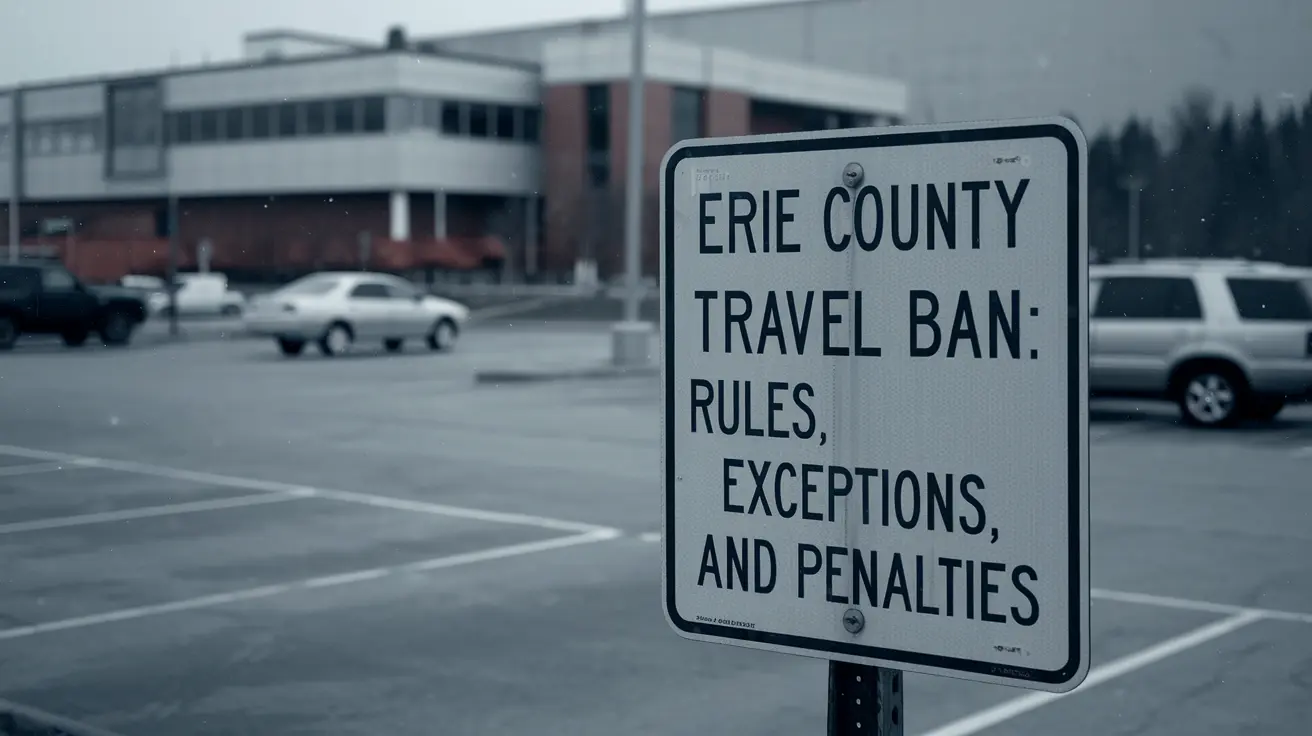When severe weather or emergencies strike, Erie County officials may impose a travel ban to keep residents safe. These bans help reduce accidents, keep emergency routes clear, and protect the community from unnecessary risks.
What Triggers an Erie County Travel Ban?
An Erie County travel ban is typically declared due to hazardous conditions such as:
- Heavy Snowstorms: Blizzards can make roads impassable.
- Icy Roads: Freezing rain can create treacherous driving conditions.
- Flooding: High water levels can lead to road closures.
- Strong Winds: High winds can bring down trees and power lines, making roads unsafe.
- Other Emergencies: Chemical spills, infrastructure damage, or public safety threats may also lead to travel restrictions.
Authorities notify the public through local news, social media, and emergency alerts.
Understanding Erie County Travel Ban Levels
There are different levels of travel restrictions in Erie County:
Travel Advisory
- Roads are dangerous but open to travel.
- Drivers should proceed with caution and avoid unnecessary trips.
- Public transportation may be delayed or disrupted.
Travel Restriction
- Only essential personnel, including first responders and utility workers, are allowed on the roads.
- Non-essential travel is strongly discouraged.
- Businesses may be asked to close or allow employees to work from home.
Full Travel Ban
- No public travel is permitted except for emergency vehicles.
- Violators may face penalties, including fines and citations.
- Gas stations and convenience stores may operate on limited hours.
Who Is Exempt from the Erie County Travel Ban?
While most people must comply with the travel bans in Erie County, certain individuals and vehicles are exempt:
- Emergency Responders: Police, firefighters, and paramedics can travel as needed.
- Utility Crews: Workers fixing power lines and clearing roads are permitted to travel.
- Government Officials: Public safety and emergency management personnel are exempt.
- News Reporters: Accredited media personnel covering the situation are allowed on the roads.
- Medical Necessities: Those needing urgent medical care can travel, but may require documentation.
- Plow Operators and Road Crews: Essential to keeping roads clear and safe.
- Delivery of Critical Supplies: Food, fuel, and medical supply deliveries may be allowed under strict guidelines.
Consequences of Ignoring the Erie County Driving Ban
Violating an Erie County driving ban can lead to serious consequences. Law enforcement officers monitor compliance and may impose penalties, such as:
Fines and Penalties
- Drivers caught violating a ban may be fined between $100 and $500.
- Repeat offenders may face steeper fines.
Vehicle Impoundment
- Vehicles blocking emergency routes may be towed at the owner’s expense.
- Additional storage fees may apply if the vehicle is not claimed promptly.
Liability in Accidents
- Insurance companies may deny coverage for accidents occurring during a ban.
- Violators could be held financially responsible for damages.
Potential Criminal Charges
- Reckless disregard for a travel ban could result in misdemeanor charges.
- Severe cases may lead to community service requirements or court appearances.
How to Stay Updated on Erie County Travel Bans
To stay informed about travel bans in Erie County, use these resources:
- County Government Website: Official emergency declarations and updates.
- Local News Stations: Real-time coverage of conditions and restrictions.
- Social Media Updates: Follow Erie County emergency services for instant alerts.
- Emergency Notifications: Sign up for alerts via text or email.
- Weather Apps: Enable severe weather alerts on your mobile device.
What to Do During an Erie County Travel Ban
If a travel ban is in effect, follow these best practices:
- Stay Indoors: Avoid unnecessary risks and wait for the ban to be lifted.
- Stock Up on Essentials: Keep extra food, water, and medicine at home.
- Keep Vehicles Off Roads: Allow emergency responders to do their jobs.
- Check on Neighbors and Family: Ensure vulnerable individuals have what they need.
- Secure Outdoor Property: High winds or snow accumulation can cause damage to outdoor structures.
- Prepare for Possible Power Outages: Have flashlights, batteries, and alternative heating sources available.
How to Prepare for Future Travel Bans
Taking proactive steps can help you stay safe during Erie County driving bans:
- Winterize Your Car: Keep emergency supplies like blankets, flashlights, and food in your vehicle.
- Plan Alternative Work Arrangements: If you must travel for work, discuss options with your employer.
- Stay Informed About Weather Patterns: Sign up for severe weather alerts.
- Have Emergency Supplies Ready: Maintain a three-day supply of essentials at home.
- Create a Backup Power Plan: If you rely on electricity for medical devices, have a generator or battery backup available.
- Prepare an Evacuation Plan: If conditions worsen, know where you can seek shelter safely.
What Happens After a Travel Ban is Lifted?
Once an Erie County travel ban is lifted, it doesn’t mean roads are immediately safe. Keep these points in mind:
- Drive Cautiously: Roads may still be icy, covered in snow, or blocked by debris.
- Watch for Road Closures: Some areas may remain restricted due to damage or flooding.
- Expect Delays: Public transportation, mail services, and deliveries may take time to return to normal.
- Refuel Your Vehicle: Gas stations may have limited supply after a prolonged ban.
- Report Hazards: Notify authorities about fallen trees, downed power lines, or road damage.
Final Thoughts
The Erie County travel ban is a vital tool for protecting residents during hazardous conditions. By understanding the rules, respecting exemptions, and staying informed, you can navigate these restrictions safely.
Follow official guidance, prioritize safety, and be prepared for any future travel bans in Erie County.

